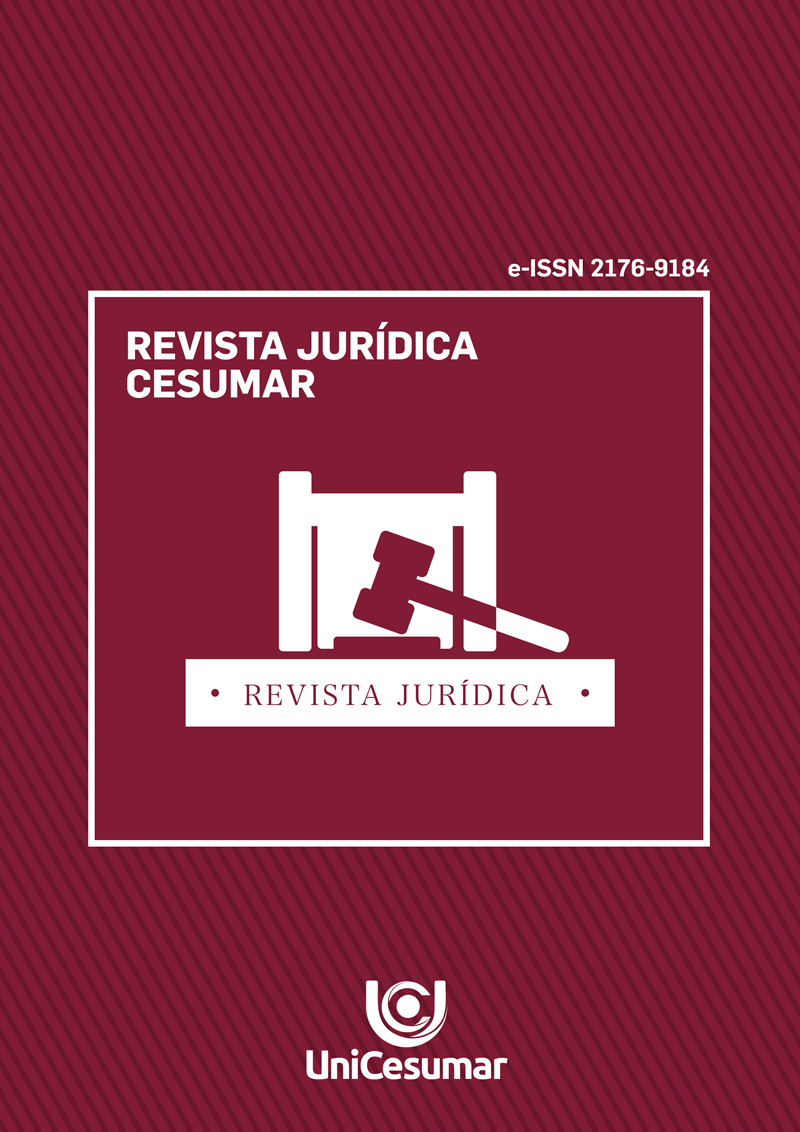The decisions of the Federal Supreme Court regarding the succession of companions and elderly people, analyzed in accordance with the principles of private autonomy and the dignity of the human person
DOI:
https://doi.org/10.17765/2176-9184.2024v24n2.e12756Keywords:
Mandatory Separation of Assets, Succession, Equality, Private Autonomy, Dignity of Human PersonAbstract
This article addresses the relationship between the dignity of the human person and private autonomy, two fundamental pillars in the structure of the Brazilian legal system, especially focusing on the Federal Constitution of 1988 and the Civil Code of 2002. The dignity of the human person is highlighted as the maximum value within the Constitution, forming the basis on which the Democratic Rule of Law is built and significantly influencing the interpretation and application of laws in Brazil. At the same time, autonomy of will, although not expressly mentioned in the Constitution, is recognized as essential to individual freedom, allowing people to determine their own actions and agreements within a legal framework. The article also examines specific criticisms of articles 1,641, II and 1,790 of the Civil Code, which deal with the property regime in marriages of people over 70 years of age and succession for partners in a stable union, respectively. Through the analysis of recent decisions of the Federal Supreme Court, the text seeks to understand how jurisprudence has faced challenges between legislation and the constitutional principles of equality, human dignity and private autonomy. The STF's decision in Extraordinary Appeal 878.694/MG and ARE 1.309.642 stands out as examples of how the judiciary has dealt with these issues, highlighting the importance of constitutional principles such as equality and human dignity in the formation of a legal system more fair and equitable.
References
BRASIL. Lei nº 10.406, de 10 de janeiro de 2002. Institui o Código Civil. Diário Oficial da União: seção 1, Brasília, DF, ano 139, n. 8, p. 1-74, 11 jan. 2002. Disponível em: https://www.planalto.gov.br/ccivil_03/leis/2002/l10406compilada.htm. Acesso em: 25 mar. 2024.
BRASIL. Supremo Tribunal Federal (Tribunal Pleno). Recurso Extraordinário. RE 878.694/MG. DIREITO CONSTITUCIONAL E CIVIL. RECURSO EXTRAORDINÁRIO. REPERCUSSÃO GERAL. INCONSTITUCIONALIDADE DA DISTINÇÃO DE REGIME SUCESSÓRIO ENTRE CÔNJUGES E COMPANHEIROS. Relator: Min. Luís Roberto Barroso. 10 de maio de 2017 Disponível em: https://redir.stf.jus.br/paginadorpub/paginador.jsp?docTP=TP&docID=14300644. Acesso em 25 mar 2024
BRASIL. Supremo Tribunal Federal (Tribunal Pleno). Recurso Extraordinário. RE 646.721/RS. DIREITO CONSTITUCIONAL E CIVIL. RECURSO EXTRAORDINÁRIO. REPERCUSSÃO GERAL. APLICAÇÃO DO ARTIGO 1.790 DO CÓDIGO CIVIL À SUCESSÃO EM UNIÃO ESTÁVEL HOMOAFETIVA. INCONSTITUCIONALIDADE DA DISTINÇÃO DE REGIME SUCESSÓRIO ENTRE CÔNJUGES E COMPANHEIROS. Relator: Min. Marco Aurélio. 30 de novembro de 2018 Disponível em: https://jurisprudencia.stf.jus.br/pages/search/sjur396445/false. Acesso em 20 mar 2024.
BRASIL. Supremo Tribunal Federal (Tribunal Pleno). Recurso Extraordinário com Agravo. ARE 1.309.642/SP. Recurso extraordinário em que se discute, à luz dos artigos 1º, III, 30, IV, 50, I, X, LIV, 226, § 3º e 230 da Constituição Federal, a constitucionalidade do artigo 1.641, II, do Código Civil, que estabelece ser obrigatório o regime da separação de bens no casamento da pessoa maior de setenta anos, e a aplicação dessa regra às uniões estáveis, considerando o respeito à autonomia e à dignidade humana, a vedação à discriminação contra idosos e a proteção às uniões estáveis. Relator: Min. Luís Roberto Barroso. 1º de fevereiro de 2024 Disponível em: https://portal.stf.jus.br/jurisprudenciaRepercussao/verAndamentoProcesso.asp?incidente=6096433&numeroProcesso=1309642&classeProcesso=ARE&numeroTema=1236. Acesso em 20 mar 2024.
BRASIL. Supremo Tribunal Federal (Tribunal Pleno). Ação Direta de Inconstitucionalidade. ADI 4277. ARGUIÇÃO DE DESCUMPRIMENTO DE PRECEITO FUNDAMENTAL (ADPF). PERDA PARCIAL DE OBJETO. RECEBIMENTO, NA PARTE REMANESCENTE, COMO AÇÃO DIRETA DE INCONSTITUCIONALIDADE. UNIÃO HOMOAFETIVA E SEU RECONHECIMENTO COMO INSTITUTO JURÍDICO. CONVERGÊNCIA DE OBJETOS ENTRE AÇÕES DE NATUREZA ABSTRATA. JULGAMENTO CONJUNTO. Relator: Ministro Ayres Brito. 05 de maio de 2011. Disponível em: https://redir.stf.jus.br/paginadorpub/paginador.jsp?docTP=AC&docID=628635. Acesso em: 30 mar 2024.
CARDOSO, Alenilton, da Silva. O sentido ético da justiça funcional solidária. São Paulo/SP. Ed. Ixtlan, 2016.
CARDOSO, Alenilton, da Silva. Princípio da Solidariedade: o paradigma ético do direito contemporâneo. São Paulo: Ed. Ixtlan, 2014.
DIAS, Maria Berenice. Manual de direito das famílias. São Paulo: Revista dos Tribunais, 2016.
FOLLMER, Juliana. A atividade notarial e registral como delegação do Poder Público. Porto Alegre: Norton editor, 2004.
GORCZEVSKI, Clovis. Direitos Humano, educação e cidadania: conhecer, educar, praticar. 2 ed. Santa Cruz do Sul: EDUNISC, 2016
HIRONAKA, Giselda Maria Fernandes Novaes. Direito sucessório brasileiro: ontem, hoje e amanhã. Revista Brasileira de Direito de Família, ano III, nº 12, jan.fev.mar./2002.
REALE, Miguel. Casamento sob o regime da separação total de bens, voluntariamente escolhido pelos nubentes. Compreensão do fenômeno sucessório e seus critérios hermenêuticos. A força normativa do pacto antenupcial. Revista Trimestral de Direito Civil – RTDC, ano 6, vol. 24, outubro a dezembro de 2005.
REIS, Jorge Renato dos. A constitucionalização do Direito Privado: algumas considerações para análise. In: Revista Atos e Fatos, p. 119, Caxias do Sul: UCS, 2009.
REIS, Jorge Renato dos, FREITAS, P.; Caso Aída Curi e o dever fundamental de solidariedade entre gerações. Revista Thesis Juris. Jan/jun 2023.
REIS, Jorge Renato dos, KUNDE, Bárbara Michele. A construção de um novo paradigma de sociedade fraterna: Reflexões a partir do princípio da solidariedade para a concretização de Direitos Fundamentais. In Intersecções Jurídicas entre o Público e o Privado: A dogmática do princípio da solidariedade. Org. REIS, Jorge Renato dos. FREITAS. Priscila de. Ed. Íthala. Curitiba. 2021. 9-24.
REIS, Jorge Renato dos, BRANDT, Fernanda. Educar para a Solidariedade: Pensar Global, agir local. In Intersecções Jurídicas entre o Público e o Privado: A solidariedade como paradigma. Org. REIS, Jorge Renato dos. FREITAS. Priscila de. Íthala. Curitiba. 2019.33-52.
SARLET, Ingo Wolfgang. Dignidade (da Pessoa) humana e direitos fundamentais na Constituição Federal de 1988. 10 ed. Porto Alegre: Livraria do Advogado, 2019.
VELOSO, Zeno, Novo código civil: sucessão dos cônjuges. Revista do Advogado, São Paulo, n. 98, p. 237-238, 2008.
WALD, Arnoldo. Curso de Direito Civil Brasileiro: Direito das Sucessões. São Paulo: Sugestões Literárias, 1972
Downloads
Published
How to Cite
Issue
Section
License
Copyright (c) 2024 Revista Jurídica Cesumar - Mestrado

This work is licensed under a Creative Commons Attribution 4.0 International License.
A Revista se reserva o direito de efetuar, nos originais, alterações de ordem normativa, ortográfica e gramatical, com o intuito de manter o padrão culto da língua, respeitando, porém, o estilo dos autores. As opiniões emitidas pelos autores são de sua exclusiva responsabilidade.
Os direitos autorais pertencem exclusivamente aos autores. Os direitos de licenciamento utilizado pelo periódico é a licença Commons Atribuição 4.0 Internacional. São permitidos o compartilhamento (cópia e distribuição do material em qualquer meio ou formato) e adaptação (remixar, transformar, e criar a partir do trabalho, mesmo para fins comerciais), desde que lhe atribuam o devido crédito pela criação original.

















